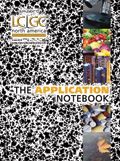Multiresidue Analysis of Cereal Grains Using a Modified QuEChERS Method with GC–TOFMS and UPLC–MS-MS Analysis
This QuEChERS procedure is specifically adapted to cereal grain matrices such as corn, oats, rice, and wheat using UPLC-MS-MS and automated direct sample introduction GC-TOFMS to achieve good recoveries of 176 analytes.
Don Shelly and Craig A. Perman, UCT, LLC
This QuEChERS procedure is specifically adapted to cereal grain matrices such as corn, oats, rice, and wheat using UPLC-MS-MS and automated direct sample introduction GC-TOFMS to achieve good recoveries of 176 analytes.
Materials and Instruments
1) Sample Preparation
a) Thoroughly homogenize a sample of grain product
b) Place appropriate weight** of sample into the 50 ml centrifuge tube
c) Add 10 mL of deionized water (15 mL for rice) and 10 mL of MeCN
d) Add 200 μL of ISTD standard solution
e) Vortex tube to disperse sample and standard for 1 h
f) Add the contents of UCT ECMSSC50CT-MP pouch to centrifuge tube
g) Immediately seal tube and vortex for 1 min
h) Centrifuge @ rcf >3,000 for 10 min

Figure 1
2) Sample Clean-up
a) Transfer a 1 mL aliquot to a 2 mL UCT CUMPS15C18CT tube and vortex for 30 s
b) Centrifuge for 5 min
c) Transfer 300 μL of the supernatant into the chamber of a Mini-UniPrep syringeless filter vial (Whatman) and add 30 μL 1 μg/mL QC solution*
d) Press the 0.2 μm polyvinylidine fluoride (PVDF) filter of the Mini-UniPrep to filter the extract for the UPLC-MS-MS analysis
e) Transfer 125 μL of the extract from step c) into a deactivated glass insert for GC-TOFMS analysis
f) Sample is now ready for analysis
3) Analysis by UPLC-MS-MS
a) Acquity UPLC interfaced to a Quattro Premier triple-quad mass spectrometer (Waters Corp.) MassLynx software v 4.1 or equivalent
b) Column: Acquity UPLC BEH C18 (50 × 2.1 mm, 1.7 μm particle size, 130 Å (pore) or equivalent Temp: 40 °C, Inj. Volume: 2 μL
c) Binary Mobile Phase: A: 10 mM ammonium formate in water (pH 3, adjusted with formic acid)
B: 10 mM ammonium formate in methanol, gradient flow @ 450 μ L/min

Figure 2
4) MS Determination for UPLC
Electrospray (ESI) positive mode MS-MS ion transitions.
The MS source conditions:
- capillary voltage of 1.7 kV
- extractor voltage of 4.0 V
- RF lens at 0.9 V
- source temperature of 130 °C
- desolvation temperature of 350 °C
- collision gas (argon) pressure of 4.31 × 10-3 mbar
- desolvation gas (N2) flow of 600 L/h
- cone gas (N2) flow of 100 L/h
5) For GC Amenable Pesticides Use Automated DSI-GC-TOF Mass Analyzer
GC Column: Use a combination of a 20 m × 0.25 mm id × 0.25 μm film thickness RTX-5 ms column and a 1 m × 0.1 mm id × 0.1 μm film thickness RTX-pesticide 2 column (Restek). This translates into a 1.68 m × 0.1 mm id "virtual" column setting in the ATAS Evolution software or equivalent.
Oven Temperature Program (start after a 4.5 min solvent vent period): 60 °C, hold for 4 min then ramp to 180 °C at 20 °C/min, then ramp 5 °C/min to 230 °C, then 20 °C/min to 280 °C, and finally ramp to 300 °C at 40 °C/min, hold for 12 min. Total run time is 35 min.
Automated DSI injection: 10 μL of sample extract
Optic 3 PTV Conditions: 100 °C for 4.5 min
Automated DSI-GC-TOFMS Analysis:
- Agilent 6890 GC equipped with a secondary oven and nonmoving quad-jet dual stage modulator for two-dimensional comprehensive GC-GC chromatography or equivalent
- Pegasus 4D (LECO Corp., St. Joseph, MI) TOF mass spectrometer or equivalent
- Inject using CombiPAL autosampler (Leap Technologies, Carrboro, NC) or equivalent
- Automated DSI accessory (LINEX) with an Optic 3 programmable temperature vaporizer (PTV) inlet (ATAS-GL International, Veldhoven, The Netherlands) or equivalent
- LECO ChromaTOF (version 3.22) software for GC-TOFMS control and data acquisition/processing or equivalent
- CombiPAL Cycle Composer with macro editor (version 1.5.2) and ATAS Evolution software (version 1.2a) to control the automated DSI process and PTV (including column flow) or equivalent
Conclusion
The majority of analytes were shown to be detectable at sensitivities of 10 ng/g using this adapted QuEChERS approach. The developed method provided good results for the majority of the tested analytes and is currently being used for routine multiresidue analysis of pesticides in cereal grains and other matrices with high fatty acid content such as flaxseed, peanuts, or various doughs. Analyte recoveries and RSD's show good distribution in the range of 70-120%. Low recovery analytes may be classified into four groups: 1) degradation issues compounds; 2) high lipophilic nature; 3) high affinity to PSA; and 4) low signal intensity. Increasing PSA helps in the removal of lipids, but potentially reduces recovery of lipophilic analytes such as hexachlorobenzene, one of the more fat soluble compounds. The optimized DSI-LVI-GC-TOFMS and UPLC-MS-MS conditions may also be employed in the routine analysis of various fruit and vegetable extracts prepared by the buffered AOAC version of the QuEChERS method.
* Summarized from Katherine Matstkova and Steve Lehotay, "Pesticide Multiresidue Analysis in Cereal Grains Using Modified QuEChERS Method Combined with Automated Direct Sample Introduction GC-TOFMS and UPLC-MS/MS Techniques", J. of Agricultural and Food Chemistry. Full article at http://forums.unitedchem.com/
** corn 2.5 g, oat 3.5g, rice 5.0 g, wheat 5.0 g.

UCT, LLC
2731 Bartram Road, Bristol, PA 19007
tel. (800)385-3153; Email: methods@unitedchem.com
Website: www.unitedchem.com















